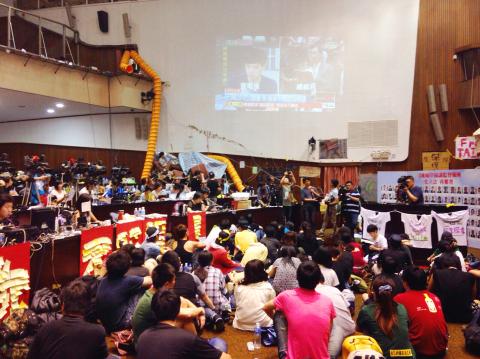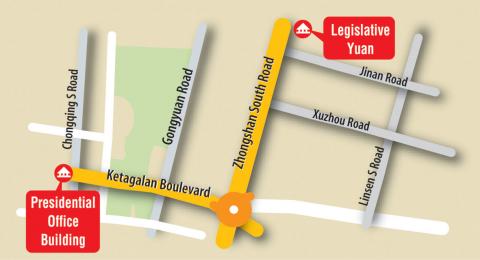Student protesters occupying the legislative chamber in protest against the government’s handling of the cross-strait service trade pact last night denounced a press conference President Ma Ying-jeou (馬英九) held earlier in the day in response to their demands. The students said Ma’s comments lacked both substance and sincerity.
Student protest leader Lin Fei-fan (林飛帆) said that Ma “has apparently refused our main request, which is to institutionalize a special law for the oversight of cross-strait agreements before reviewing the cross-strait service trade pact.”
“By snubbing this demand, the Ma administration has refused the public’s right to amend or veto the agreement. Without the institutionalization of a monitoring mechanism, no one knows by what process the pact would be reviewed,” Lin said.

Photo: CNA
Ma’s response to the request for a citizens’ constitutional conference was incomplete, he said.
Lin said the conference was proposed because the country is facing a constitutional crisis brought about by “an unchecked executive power and a legislative power kidnapped by [Chinese Nationalist Party (KMT)] discipline and [our] electoral system, which is unresponsive to public opinion.”
The students also criticized Ma for backing statements by Premier Jiang Yi-huah (江宜樺) and National Police Agency Director-General Wang Cho-chiun’s (王卓鈞) that forcefully evicting students from the Executive Yuan early on Monday morning — an action in which scores of students and police officers were injured — had been “completely legal.”

“With none of our four requests receiving substantial and concrete promises, we will, as planned, stage a peaceful, adamant demonstration tomorrow [today], and cannot but continue our movement,” Lin said.
Chen Wei-ting (陳為廷), another student leader, said that Ma was “repeating himself.”
“What the president proposed was only allowing us to take a look at the pact, but not to review it in substantial terms [with the possibility of changing clauses],” he said. “What we are asking is to legislate first [for a cross-strait agreement oversight act] before reviewing the pact, but President Ma said the two can take place simultaneously. This will only repeat the history of KMT Legislator Chang Ching-chung’s (張慶忠) 30-second ramming-through [of the service-trade pact].”
“What we mean by ‘the retraction of the cross-strait service trade agreement’ is to have the pact sent back to the Executive Yuan and to also make room for a citizens’ constitutional conference to participate in the review process,” Chen said.
Earlier in the day, the protest leaders said that all members of the public nationwide have to stand up today for their democratic rights and the survival of their hard-won democracy.
Joined by scores of representatives of non-governmental organizations, the protesters told a morning press conference that the rally today in Taipei would be a non-violent one and they cautioned the police against going overboard to enforce the law.
As the students’ occupation of the Legislative Yuan continued into the 12th day, “the government is still ignoring our demand for the institutionalization of a cross-strait agreement oversight mechanism and responding by besmirching our cause and talking nonsense,” the students and civil groups said.
“We will show through the 3/30 Ketagalan Boulevard demonstration that we are not a minority and not a violent mob, but a group of citizens who are deeply worried about our country’s crisis of constitutionalism,” the protesters said in a statement.
The anti-“black-box” service trade pact movement has been followed and echoed by overseas Taiwanese too, they said.
The students also announced that they have established an internal deliberative mechanism to counteract and respond to the government’s future calls for communication, be they private or public.
The announcement was made in response to a hullabaloo caused by a supposedly personal meeting between one of the movement’s leaders, Huang Kuo-chang (黃國昌), an assistant research fellow at Academia Sinica, and Presidential Office Deputy Secretary-General Hsiao Hsu-tsen (蕭旭岑) on Friday.
The meeting, after it was exposed, raised doubts about the secrecy of the unauthorized talk, which other student leaders did not know about.
Calling for an end to the authorities’ “private calls and unofficial release of information, and probing and dividing tactics,” civil groups and student representatives have achieved a consensus over the building up of an internal democratic decision-making mechanism to counteract the Presidential Office’s “off-the-record actions,” one of the student group’s representatives said.
The student leaders also responded to questions from the media about a possible communication between the students and President Ma Ying-jeou.
Student leader Chen said that during the previous discussion about the possible meeting, “we had lost our trust in the Ma administration.”
“We are asking Ma not to use party discipline to restrain his party’s (Chinese Nationalist Party – KMT) legislators’ reaction to the proposal of the institutionalization of a mechanism for overseeing cross-strait agreements,” Chen said. “If he cannot promise this, where is the room for discussion?”

CALL FOR SUPPORT: President William Lai called on lawmakers across party lines to ensure the livelihood of Taiwanese and that national security is protected President William Lai (賴清德) yesterday called for bipartisan support for Taiwan’s investment in self-defense capabilities at the christening and launch of two coast guard vessels at CSBC Corp, Taiwan’s (台灣國際造船) shipyard in Kaohsiung. The Taipei (台北) is the fourth and final ship of the Chiayi-class offshore patrol vessels, and the Siraya (西拉雅) is the Coast Guard Administration’s (CGA) first-ever ocean patrol vessel, the government said. The Taipei is the fourth and final ship of the Chiayi-class offshore patrol vessels with a displacement of about 4,000 tonnes, Lai said. This ship class was ordered as a result of former president Tsai Ing-wen’s (蔡英文) 2018

UKRAINE, NVIDIA: The US leader said the subject of Russia’s war had come up ‘very strongly,’ while Jenson Huang was hoping that the conversation was good Chinese President Xi Jinping (習近平) and US President Donald Trump had differing takes following their meeting in Busan, South Korea, yesterday. Xi said that the two sides should complete follow-up work as soon as possible to deliver tangible results that would provide “peace of mind” to China, the US and the rest of the world, while Trump hailed the “great success” of the talks. The two discussed trade, including a deal to reduce tariffs slapped on China for its role in the fentanyl trade, as well as cooperation in ending the war in Ukraine, among other issues, but they did not mention

HOTEL HIRING: An official said that hoteliers could begin hiring migrant workers next year, but must adhere to a rule requiring a NT$2,000 salary hike for Taiwanese The government is to allow the hospitality industry to recruit mid-level migrant workers for housekeeping and three other lines of work after the Executive Yuan yesterday approved a proposal by the Ministry of Labor. A shortage of workers at hotels and accommodation facilities was discussed at a meeting of the legislature’s Transportation Committee. A 2023 survey conducted by the Tourism Administration found that Taiwan’s lodging industry was short of about 6,600 housekeeping and cleaning workers, the agency said in a report to the committee. The shortage of workers in the industry is being studied, the report said. Hotel and Lodging Division Deputy Director Cheng

‘SECRETS’: While saying China would not attack during his presidency, Donald Trump declined to say how Washington would respond if Beijing were to take military action US President Donald Trump said that China would not take military action against Taiwan while he is president, as the Chinese leaders “know the consequences.” Trump made the statement during an interview on CBS’ 60 Minutes program that aired on Sunday, a few days after his meeting with Chinese President Xi Jinping (習近平) in South Korea. “He [Xi] has openly said, and his people have openly said at meetings, ‘we would never do anything while President Trump is president,’ because they know the consequences,” Trump said in the interview. However, he repeatedly declined to say exactly how Washington would respond in